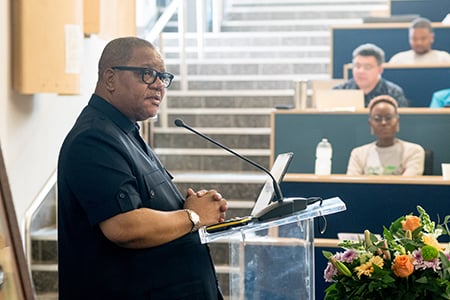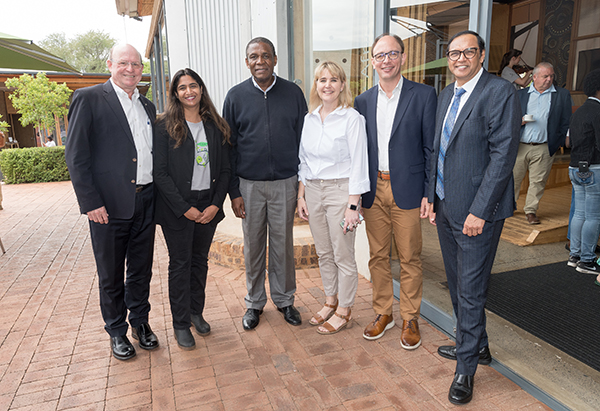25 Years of Research Excellence: UP’s FABI Celebrates Milestone Anniversary
The Forestry and Agriculture Biotechnology Institute (FABI) at the University of Pretoria (UP) recently turned 25, a milestone that was celebrated at the University’s Future Africa Institute and attended by research collaborators, industry partners, government representatives and the UP community.
“As we look back over the past quarter century, it is awe-inspiring to consider the groundbreaking research, transformative discoveries and the dedicated individuals who have been at the heart of FABI’s success,” said Interim Vice-Chancellor and Principal Professor Themba Mosia in his welcome remarks. “FABI stands as a testament to the power of collaboration, the pursuit of knowledge and the commitment to addressing some of the most pressing challenges facing our planet.”

Interim Vice-Chancellor and Principal Professor Themba Mosia welcoming guests to the celebration.
FABI has experienced sustained growth in 25 years. From its humble beginnings with 56 people, the institute now comprises about 350 individuals, including academic staff, postgraduate students, postdoctoral fellows, research visitors and technical support staff.
FABI has long served as a collaborative hub, with its origins rooted in a comprehensive mission to establish an independent postgraduate entity specialising in forestry and agricultural biotechnology. Its research extends to various aspects of everyday life, including paper production, food security, tree health and the lifespan of trees.
At the event, former UP Vice-Chancellor and Principal Dr Johan van Zyl spoke about the original idea and vision of FABI, emphasising that the institute’s success is the result of a strong vision, great people and hard work.
“I was just 40 years old when I was appointed Vice-Chancellor at UP,” he recalled. “I was young and full of ideas and dreams. During that time, we were faced with many challenges like old structures, lack of collaboration among faculties and departments, and a lack of money. FABI came about as a way to create a space for transdisciplinary research collaborations in the biotechnology field.”
Applying research to real-world challenges
Prof Mike Wingfield, an advisor to UP’s Executive and the founding director of FABI, shared Dr Van Zyl’s sentiments, stating that many of the challenges that the world is faced with can be solved through the kind of collaborative work carried out by institutions like FABI.
“Issues such as climate change, food security and artificial intelligence are taking the world by storm and all of these will be solved through interdisciplinary research – that is why FABI is and will continue to be successful,” he said.

Among guests attending the celebrations were founding director of FABI Professor Mike Wingfield, programme leader at FABI Professor Sanushka Naidoo, Dr Khotso Mokhele – Chairman of the Hans Merensky board and the board of Westfalia Fruit, research leader at FABI Professor Noelani Van Den Berg, Director of FABI Professor Bernard Slippers and Professor Sunil Maharaj, Deputy Vice-Principal of Research and Postgraduate Studies at UP.
Dr Khotso Mokhele – Chairman of both the Hans Merensky board and the board of Westfalia Fruit, an avocado company affiliated with FABI – was also in attendance. The Hans Merensky Foundation (HMF) funds UP’s Chair in Avocado Research, which is the world’s largest programme in this subject. The programme is facilitated by FABI and focuses on several aspects of avocado tree health and pathogen biology. Dr Mokhele spoke about the institute’s role as an industry partner and the incredible impact it has had in the food industry, specifically in the avocado industry.
“As a company out of Tzaneen, Westfalia Fruit is very proud to be a key player in driving a global industry based on the research that is being conducted by FABI,” he said. “The work funded by the HMF as well as some of the collaborative work carried out between the company and FABI will continue to be transformative in this particular industry.”
The full-day celebrations included art exhibitions and music. Professor Bernard Slippers, Director of FABI and a professor in the Department of Biochemistry, Genetics and Microbiology, also launched the FABI Biennial Report 2022 – 2023, which showcases the cutting-edge research carried out by the institute over the past two years.
“As we reflect on another two years of excellence and impact on the lives and businesses of our stakeholders, personnel, postdoctoral fellows and students, we extend our heartfelt gratitude for the dedication, passion and partnerships that make FABI such a special place,” Prof Slippers said. “Thank you for being part of our journey.”

